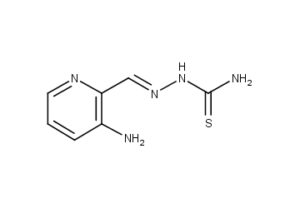Triapine CAS NO 143621-35-6 Inquire about Triapine
Tecoland supplies Triapine bulk active pharmaceutical ingredient (API) to the pharmaceutical industry. Our Triapine is manufactured by cGMP compliant facility. Welcome to contact us for further details including current DMF status for the product and up to date regulatory status of the manufacturing facility. We look forward to assisting you with your research and development projects.
Clinical Trials Using Triapine
Clinical trials are research studies that involve people. The clinical trials on this list are studying Triapine. All trials on the list are supported by NCI.
NCI’s basic information about clinical trials explains the types and phases of trials and how they are carried out. Clinical trials look at new ways to prevent, detect, or treat disease. You may want to think about taking part in a clinical trial. Talk to your doctor for help in deciding if one is right for you.
Trials 1-4 of 4
This randomized phase III trial studies radiation therapy and cisplatin with triapine to see how well they work compared to the standard radiation therapy and cisplatin alone in treating patients with newly diagnosed stage IB2, II, or IIIB-IVA cervical cancer or stage II-IVA vaginal cancer. Radiation therapy uses high energy protons to kill tumor cells and shrink tumors. Drugs used in chemotherapy, such as cisplatin, work in different ways to stop the growth of tumor cells, either by killing the cells, by stopping them from dividing, or by stopping them from spreading. Triapine may stop the growth of tumor cells by blocking some of the enzymes needed for cell growth. It is not yet known whether radiation therapy and cisplatin are more effective with triapine in treating cervical or vaginal cancer.
Location: 257 locations
This phase I trial studies the side effects and best dose of triapine when given with radiation therapy and cisplatin in treating patients with stage IB2-IVA cervical or vaginal cancer. Triapine may stop the growth of cancer cells by blocking an enzyme needed for cell growth. Cisplatin is a drug used in chemotherapy that kills cancer cells by damaging their deoxyribonucleic acid (DNA) and stopping them from dividing. Radiation therapy uses high-energy x-rays to kill tumor cells and shrink tumors. Adding triapine to standard treatment with cisplatin and radiation therapy may kill more cancer cells.
Location: 9 locations
This phase I trial studies the side effects and best dose of triapine when given together with lutetium Lu 177 dotatate in treating patients with neuroendocrine tumors. Triapine may stop the growth of tumor cells by blocking some of the enzymes needed for cell growth. Radioactive drugs, such as lutetium Lu 177 dotatate, may carry radiation directly to tumor cells and not harm normal cells. Giving triapine and lutetium Lu 177 dotatate together may be a good way in treating patients with neuroendocrine tumors.
Location: 6 locations
This early phase I trial investigates the response of the anti-cancer drug, triapine, in uterine cancers by using markers from tissue samples at the time of removal of the uterus, ovaries, and fallopian tubes (hysterectomy and bilateral salpingo-oophorectomy). Triapine may stop the growth of tumor cells by blocking some of the enzymes needed for cell growth. Adding triapine to the usual approach of surgery followed by chemotherapy alone or in combination with radiation therapy may help to slow the growth of uterine cancer.
Location: See Clinical Trials.gov
Disclaimer:
Information on this page is provided for general information purposes. You should not make a clinical treatment decision based on information contained in this page without consulting other references including the package insert of the drug, textbooks and where relevant, expert opinion. We cannot be held responsible for any errors you make in administering drugs mentioned on this page, nor for use of any erroneous information contained on this page.
External Link:
Intervention Dynamic Trial Listing Page. (n.d.). National Cancer Institute. https://www.cancer.gov/about-cancer/treatment/clinical-trials/intervention/triapine